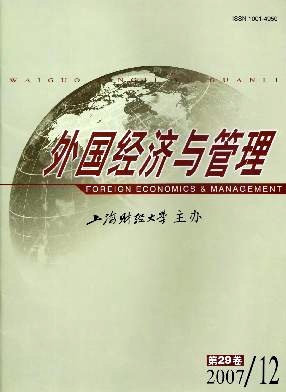长任期CEO薪酬现象的理论诠释
外国经济与管理 2007 年 第 29 卷第 12 期, 页码:43 - 49
摘要
参考文献
摘要
CEO任期的长短显著影响着董事会关于CEO薪酬的决策过程,CEO薪酬的总体水平随着其任期的延长而上升,薪酬体系的设计也日益趋向于迎合CEO的个人偏好。这种长任期CEO薪酬现象,虽然有悖委托代理理论的内在逻辑,但却是一个客观存在的事实。本文试图跳出委托代理理论的窠臼,从人力资本、经理主义和社会心理等视角对长任期CEO薪酬现象进行阐释,揭示导致长任期CEO薪酬现象的深层机理,并且对董事会关于长任期CEO薪酬决策的本真面貌进行还原。
[1]Finkelstein,S,and Hanibrick,D C.Top management team tenure and organizational outcomes:The moderating roles of managerialdiscretion[J].Administrative Science Quarterly,1990,35(3):484-503.
[2]Buono,A F,Bowditch,J L,and Lewis,J W.When cultures collide:The anatomy of a merger[J].Human Relations,1985,38(5):477-500.
[3]Jemison,D B,and Sitkin,S B.Corporate acquisitions:A process perspective[J].Academy of Management Review,1986,11(1):145-163.
[4]Barney,J B.Firm resources and sustained competitive advantage[J].Journal of Management,1991,17(1):99-120.
[5]Dierickx,I,and Cool,K.Asset stock accumulation and sustainability of competitive advantage[J].Management Science,1989,35(12):1 504-1 511.
[6]Amihud,Yakov,and Lev,Baruch.Risk reduction as a managerial motive for conglomerate mergers[J].The Bell Journal of Econom-ics,1981,12(2):605-617.
[7]Hirsch,P M,and Friedman,R.Collaboration or paradigm shift:Economic vs.behavioral thinking about policy[J].Academy ofManagement,1986,5:31-35.
[8]Pfeffer,J.Size and composition of corporate boards of directors:The organization and its environment[J].Administrative ScienceQuarterly,1972,17(2):218-228.
[9]Perrow,C.Complex organizations:Acritical essay[M].3d Ed.Glenview,Ill:Scott,Foresman&Co.,1986:177.
[10]Mace,ML.Directors:Myth and reality[R].Boston Division of Research,Harvard Graduate School of Business Administration,1971.
[11]Alderfer,C P.The invisible director on corporate boards[J].Harvard Business Review,1986,64(6):38-52.
[12]Mizruchi,MS.Who controls whom?An examination of the relation between management and boards of directors inlarge corpora-tions[J].Academy of Management Review,1983,8(3):426-435.
[13]French,J J,and Raven,B.The bases of social power[A].in D Cartwright(Ed.).Studiesin social power[C].Ann Arbor:Institu-te for Social Research,University of Michigan,1959:607-623.
[14]Zald,M N.The power and functions of boards of directors:Atheoretical synthesis[J].American Journal of Sociology,1969,75(1):97-111.
[15]Singh,Harbir,and Harianto,Farid.Management-board relationships,takeover risk,andthe adoption of golden parachutes[J].A-cademy of Management Journal,1989,32(1):7-24.
[16]O’Reilly III,Charles.A,and Main,G M.Setting the CEO’s pay:It’s more than si mple economics[J].Organizational Dynamics,2007,36(1):1-12.
[17]Hol mstrom,Bengt,and Kaplan,Steven.The state of US corporate governance:What’s right and what’s wrong[J].Journal ofApplied Corporate Finance,2003,15(3):8-20.
[18]Goobey,A.Aforwardin corporate governance:Remuneration committees[R].reported by Coopers&Lybrand,1993.
[19]Milgrom,P,and Roberts,J.Economics,organization and management[M].Englewood Cliffs,NJ:Prentice-Hall,1992.
[20]Conyon,Martin J.Tenure and contracts:The experience of U K CEOs[J].Personnel Review,1994,23(5):25-33.
[2]Buono,A F,Bowditch,J L,and Lewis,J W.When cultures collide:The anatomy of a merger[J].Human Relations,1985,38(5):477-500.
[3]Jemison,D B,and Sitkin,S B.Corporate acquisitions:A process perspective[J].Academy of Management Review,1986,11(1):145-163.
[4]Barney,J B.Firm resources and sustained competitive advantage[J].Journal of Management,1991,17(1):99-120.
[5]Dierickx,I,and Cool,K.Asset stock accumulation and sustainability of competitive advantage[J].Management Science,1989,35(12):1 504-1 511.
[6]Amihud,Yakov,and Lev,Baruch.Risk reduction as a managerial motive for conglomerate mergers[J].The Bell Journal of Econom-ics,1981,12(2):605-617.
[7]Hirsch,P M,and Friedman,R.Collaboration or paradigm shift:Economic vs.behavioral thinking about policy[J].Academy ofManagement,1986,5:31-35.
[8]Pfeffer,J.Size and composition of corporate boards of directors:The organization and its environment[J].Administrative ScienceQuarterly,1972,17(2):218-228.
[9]Perrow,C.Complex organizations:Acritical essay[M].3d Ed.Glenview,Ill:Scott,Foresman&Co.,1986:177.
[10]Mace,ML.Directors:Myth and reality[R].Boston Division of Research,Harvard Graduate School of Business Administration,1971.
[11]Alderfer,C P.The invisible director on corporate boards[J].Harvard Business Review,1986,64(6):38-52.
[12]Mizruchi,MS.Who controls whom?An examination of the relation between management and boards of directors inlarge corpora-tions[J].Academy of Management Review,1983,8(3):426-435.
[13]French,J J,and Raven,B.The bases of social power[A].in D Cartwright(Ed.).Studiesin social power[C].Ann Arbor:Institu-te for Social Research,University of Michigan,1959:607-623.
[14]Zald,M N.The power and functions of boards of directors:Atheoretical synthesis[J].American Journal of Sociology,1969,75(1):97-111.
[15]Singh,Harbir,and Harianto,Farid.Management-board relationships,takeover risk,andthe adoption of golden parachutes[J].A-cademy of Management Journal,1989,32(1):7-24.
[16]O’Reilly III,Charles.A,and Main,G M.Setting the CEO’s pay:It’s more than si mple economics[J].Organizational Dynamics,2007,36(1):1-12.
[17]Hol mstrom,Bengt,and Kaplan,Steven.The state of US corporate governance:What’s right and what’s wrong[J].Journal ofApplied Corporate Finance,2003,15(3):8-20.
[18]Goobey,A.Aforwardin corporate governance:Remuneration committees[R].reported by Coopers&Lybrand,1993.
[19]Milgrom,P,and Roberts,J.Economics,organization and management[M].Englewood Cliffs,NJ:Prentice-Hall,1992.
[20]Conyon,Martin J.Tenure and contracts:The experience of U K CEOs[J].Personnel Review,1994,23(5):25-33.
引用本文
李金早, 许晓明. 长任期CEO薪酬现象的理论诠释[J]. 外国经济与管理, 2007, 29(12): 43–49.
导出参考文献,格式为:
下一篇:工作生活质量研究述评与展望





 7924
7924  601
601

